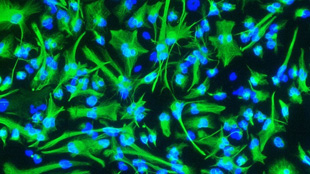 Brain cancer stem cellsWELLCOME IMAGES
Brain cancer stem cellsWELLCOME IMAGES
Why cancer comes back in some patients after chemotherapy has beaten it into remission has been a matter of debate for oncologists. In a new study published in Blood this week, researchers at The Weizmann Institute of Science in Rehovot, Israel, found that in certain blood cancers, slowly-dividing cancer stem cells that are impervious to the actions of chemotherapy—which commonly target fast-dividing cells—are the source for future recurring cancers.
Led by computational biologist Ehud Shapiro, the researchers reconstructed lineage trees of cells sampled from patients with newly diagnosed leukemia and from patients in which leukemia had returned. They found that in some cases, the source of the recurring cancer cells were not rapidly dividing cancer cells that had dodged chemotherapy, but the slowly-dividing stem cells ...





















